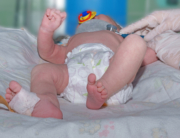Many different factors go into the settlement amount of a birth injury lawsuit, so it is difficult to answer the question of how much the average settlement is. So much of the outcome depends on the unique circumstances of your case.
A settlement happens when the plaintiff and defendant reach an agreement on how much compensation the defendant will pay the plaintiff to resolve the claim. The case does not go to trial, or if the lawsuit was already in the trial process, the parties will sign documents that contain the terms of the settlement in exchange for payment of the agreed-upon amount. After the judge approves the settlement, the plaintiff dismisses the lawsuit, and the defendant dismisses any counterclaims.
At the Montero Law Center, we will be there at every step of the way. We will advocate for you, handle the pre-trial and trial work, and negotiate with the defendant to try to reach a fair settlement of your birth injury lawsuit. Call us today at 954-767-6500 to get started.
How You Get to a Settlement of a Birth Injury Lawsuit
Because birth injury claims are usually significant lawsuits, both sides have to exchange many documents before the parties will be ready to settle. You will need to show that the defendant that you can convince the judge of their liability and the amount of your losses.
Filing the lawsuit is merely the first step in this process. The discovery phase (when both sides gather information about each other) is when the parties learn the true value of the injury claim.
How the Type of Birth Injury Impacts the Settlement Amount
Birth injuries vary in how they impact the lives of you and your child. For example, if your baby is large and the obstetrician has to break his shoulder or collarbone to deliver him, he might have temporary weakness in the affected arm, or he might suffer permanent paralysis. Other types of birth injuries can cause disfigurement, brain damage, and even death. The severity of the harm will affect the settlement value of the lawsuit.
Birth Injuries Versus Genetic Conditions
A birth injury is not the same as a genetic condition, also called a birth defect. Birth injuries happen when the baby gets hurt during labor and delivery. Human error causes many of these injuries. Most birth defects are chromosomal abnormalities in your baby’s DNA. Cleft palate, Down syndrome, and some heart defects are examples of genetic problems, not birth injuries.
The Level of Negligence Can Affect the Settlement
If your baby suffered harm because of gross negligence or outrageous conduct by a healthcare professional, that behavior can sometimes increase the value of your claim. For example, if the delivering doctor was drunk or under the influence of painkillers or other drugs, and that condition caused her to make grave errors in judgment that harmed your child, the settlement might be higher than for the same injury caused by innocent human error.
Damages for Short-Term Birth Injury
Some birth injuries do not cause permanent impairment to your baby, but the harm might require hospitalization and care that is over and above the norm for a healthy infant with an uneventful delivery. Even a short-term stay in the hospital can result in medical bills totaling tens of thousands of dollars.
The parents might miss time from work without pay to stay with the baby at the hospital and at home to recuperate. In these situations, your settlement can include the medical costs and lost wages, as well as the pain and suffering that your child endured and the mental distress of the parents.
Settlement Amounts in Catastrophic Birth Injury Lawsuits
If something goes horribly wrong during labor and delivery, your child might have a shorter lifespan, need one-on-one care for the rest of her life, or only live for a few hours or days. If the harm takes the life of your child, your settlement might include compensation for the wrongful death.
When the birth injury takes away years from your baby’s normal lifespan, you can also receive compensation for this harm. Birth injuries that cause the child to need assistive care for the rest of his life can result in astronomical costs that can increase the settlement amount.
Proving Negligence in Birth Injury Cases
If your case falls under the Florida Birth-Related Neurological Injury Compensation Plan (the Plan), we will not have to prove that one or more of the healthcare providers was negligent. The Plan is for birth-related neurological injuries to the spinal cord or brain of babies from oxygen deprivation or a mechanical injury during labor, delivery, or resuscitation right after delivery. The baby must suffer permanent and substantial physical and mental impairment as a result of the injury.
If your infant got hurt during labor and delivery from a cause that does not fall within the scope of the Plan, we will have to prove all four of these factors:
- The defendant (the doctor, nurse, midwife, hospital, or another healthcare provider or facility) had a duty of care toward your baby. Under Florida law, the defendant had a duty to provide the same quality of medical care to your infant that a typical provider would deliver in similar circumstances.
- The defendant breached the duty of care. When someone fails to live up to the standard of a legal duty of care, it is negligence.
- The negligence caused the harm to your child.
- Your infant sustained measurable harm (physical injury) as a result of the negligence.
After we gather the evidence that establishes the defendant’s liability, we can go after money damages for your losses.
Getting Help with Your Birth Injury Lawsuit
The team at the Montero Law Center focuses on helping families when they are hurt by the actions of others. If your child sustained a birth injury, we want to help. We will be happy to give you a free case evaluation.
After we complete our investigation of your matter, we can estimate a fair range for the settlement of your claim. We will work directly with the insurance company to try to reach a settlement of your birth injury lawsuit. Call us today at 954-767-6500 for a free consultation.
 English
English  Español
Español 

